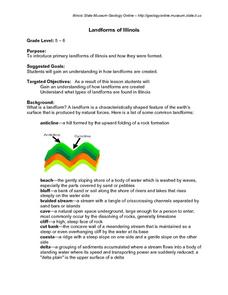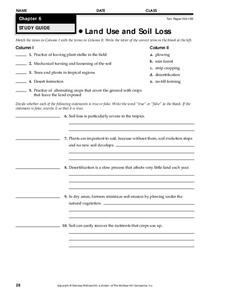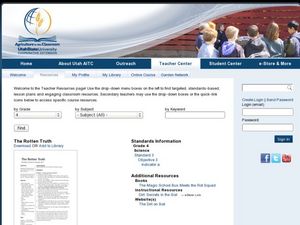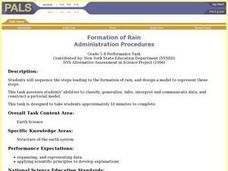Curated OER
Landforms of Illinois
Fifth and sixth graders are introduced to the primary landforms of Illinois and discover how they were created. Landform cards are made for each pupil. They use the twenty-questions format until they have identified each one. Then,...
University of Southern California
What Is The Ocean?
Go on a tour of the ocean through the lens of a scientist. Learners read maps of the ocean floor, study tide behavior, examine wave motion, and analyze components of soil. Each lesson incorporates a hands-on component.
Curated OER
Land Use and Soil Loss
In this land use and soil loss worksheet, students match 5 types of land use with their description and write true or false to 5 statements about the effects of land use and soil loss. The correct false statements to make them true.
Curated OER
The Formation and Value of Temperate Grasslands
Learners study the Temperate Grasslands biome of North America. They explain that it is an endangered ecosystem because the rich soils have been converted to farming in most areas. They view videos imbedded in this plan, then complete...
Curated OER
The Formation of Soil
Students identify the different components that make up soil. In this earth science lesson, students create a pamphlet for next year's class. They analyze how erosion and weathering shape the Earth.
Curated OER
Using Soil properties and Vegetation Differences to Hypothesize the Land Use History and Topographic Differences between Two Locations
Ninth graders take soil samples and perform tests on these samples.
Curated OER
Soil Layers
Ninth graders identify the different layers of soil. For this earth science lesson, 9th graders explain how limestone layers are formed. They identify the different parts of the coral colony.
Curated OER
Water Cycle
Identify and interpret the earth's different water sources. Third and fourth graders describe and demonstrate the process of the water cycle, make a model of its two main parts, and predict and infer to answer questions about the model.
Curated OER
Take a Stab!
Your geology class practices taking core samples of a potato to examine the stratigraphy. This is a terrific modeling lesson that helps youngsters visualize strata that cannot be seen from the surface of the ground. The directions...
Curated OER
Organic Matter
Written for an agriculture curriculum, this presentation on organic matter is also informative for gardening or horticulture classes. It details the chemical makeup, affecting factors, functions, maintenance, and composting to create a...
Columbus City Schools
ABC: Acid Base Chemistry
Bubble, bubble, boil and trouble! What causes common substances like baking soda and vinegar to react the way they do? Welcome your junior chemists to the wonders of acid-base chemistry using a comprehensive and fun resource. Engage them...
Curated OER
Creating Sand Dunes
Students explain how sand dunes are formed, the different circumstances that effect the movement of or formation of sand dunes, and relate the information gathered to soil conservation. In this sand dunes lesson, students use pans of...
Curated OER
Perkin' Through the Pores
Fourth graders explore different levels of soil. In this soil instructional activity, 4th graders investigate the amount water that can be absorbed by topsoil, subsoil, and bedrock.
Curated OER
The Rotten Truth
Fourth graders investigate compost. In this Science lesson, 4th graders take notes on the components of soil and its relation to plant growth. Students describe the steps in making compost.
Curated OER
What Land Works Best?
Fourth graders explore different types of land. In this land lesson, 4th graders investigate how water, climate, and soil type determine what types of crops may be grown. Students discover these elements while playing an interactive game.
Curated OER
Rock Cycle SIOP Unit
Students collect rocks, identify them, classify them, investigate their properties, and more. In this rocks lesson plan, students also experiment with soil and erosion and weather.
Curated OER
Working Worms
Fourth graders examine earthworms. In this earthworm lesson, 4th graders investigate how earthworms help prepare soil for planting. Students examine other living and nonliving elements in a garden habitat.
Curated OER
A Rocky Situation
Second graders conduct experiments with rocks to observe weathering. They read books, examine websites and watch a video to examine how rocks break down into soil.
Curated OER
Vertebrate History in Rocks
In this reading comprehension worksheet, students read the noted section in their science textbooks and respond to 4 short answer and 3 fill in the blank questions regarding fossils embedded in rock formations.
Curated OER
Soil Factors
Eighth graders study the nine soil factors to use in field study and to complete an exam. They learn the components and characteristics of soil.
Curated OER
COMPARE SOILS BY GROWING PLANTS
The student will identify the difference in the rate of plant growth in three soils that vary in organic matter.1. Obtain three to four flowerpots, different types of soil, a record chart, three to five beans for each pot, and water....
Curated OER
Formation of Rain
Students sequence the steps leading to the formation of rain, and design a model to represent these steps. This task assesses students' abilities to classify, generalize, infer, interpret and communicate data, and construct a pictorial...
Curated OER
Polluted Soil
Students take plants of their own choice and pollute the soil with a pollutant of their own choice or one assigned by the teacher. They regularly record observations such as plant growth, health, and soil pH.
K12 Reader
What Glaciers Leave Behind
Glaciers may seem distant and stationary, but they are huge deposits of moving ice that have made changes to the earth's surface. Your pupils can learn about the different types of impressions left by glaciers by reading the short...
Other popular searches
- Weathering and Soil Formation
- Land Formations Soil
- Rocks and Soil Formation
- Erosion and Soil Formation
- Soil Formation Video
- Process of Soil Formation
- Stages of Soil Formation
- Elementary Soil Formation
- Formation of Soil
- Soil Formation and Profile
- Soil Formation and Composition

























